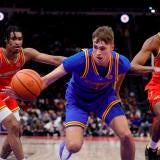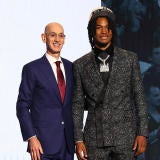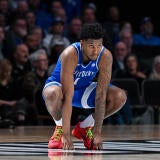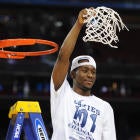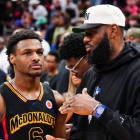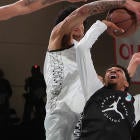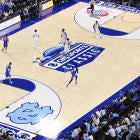Isaiah Brock joined the Army in April 2012 and was eventually assigned to the 54th Quartermaster Mortuary Affairs Company. In simple terms, that means he spent parts of the past four years extracting dead soldiers from countries in which the United States is at war.
"I aided in the process of returning these fallen heroes back home," Brock explained. "So we would basically look through all of their wounds, annotate everything, go through all of their belongings, and then ... you know how there's always a transfer case and then you have a flag draped over the top of the transfer case? That's us. That's what we do."
First he was stationed in Kandahar, Afghanistan.
Then Kuwait.
It got crazy one day in Afghanistan.
"So we were on the boardwalk in Kandahar, where they have all of these stores," Brock said. "We work closely with Marines. So I was walking with a few Marines. And we started to hear gunfire. Then we heard an alarm go off. So we all hit the floor and locked and loaded."
A terrorist had escaped a prison on base.
He was in a watch tower. He was shooting.
"We could see the gunfire," Brock said. "He was right there."
By luck, or the grace of a higher power, Brock survived that incident and every other thing that goes along with serving this country in a foreign land where enemies come in all forms. Documents show he's responsible for assisting in the extraction of more than 30 fallen soldiers, meaning if you know somebody who died fighting for the United States in recent years, it's possible Brock helped return them home.
That's been his job.
That's been his life.
And, on a lighter note, he's always enjoyed basketball, which is why one of the highlights of Brock's time in the Middle East came in August 2015, when he participated in the Hardwood Classic -- an event put on by the Troops First Foundation at Camp Arifjan in Kuwait that connects soldiers with basketball coaches and culminates with a tournament.
"It's just a fun thing," said Oakland University coach Greg Kampe. "The soldiers basically get a week off to just play basketball. People come and watch the games. It's really just a way for them to get their minds off of what they're doing."
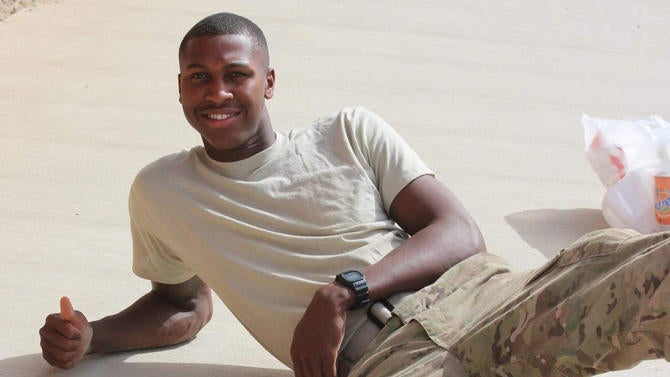
Kampe first heard about Troops First from his friend, Michigan State coach Tom Izzo. He thought it was neat. So he told Izzo to let him know the next time an opportunity to participate presented itself. Few months later, by coincidence, Kampe ended up playing golf at Oakland Hills Country Club with Rick Kell, who works with Troops First. Kampe relayed to him his interest in traveling to the Middle East. Kell told him he'd love to have him.
"So I told him, 'Next time you go, I'm in,'" Kampe said. "Then he later called and told me, 'We're going in August, if you really want in.' And I said, 'Absolutely.'"
So that's how Greg Kampe ended up in Kuwait.
He was joined by fellow coaches Steve Lavin, Dino Gaudio, Jimmy Patsos, Pete Gillen, Gary Stewart, Ed Conroy and Reggie Minton. While there, Greg Kampe met Isaiah Brock, who was on Lavin's team.
"We scrimmaged Lavin's team one day, and there's this 6-foot-8 kid who actually looks like he can play a little bit," Kampe said. "I got to talking to him, and when I found out his story I was like ... wow. Here's a guy whose job is to go into the battlefield and extract bodies. The medics go and get the wounded. The ones who are dead, it's his job to get them out."
Brock told Kampe he planned to attend college after he was discharged.
Kampe was intrigued.
"I just thought maybe I could bring him to Oakland and give back and help this young man get his education," Kampe said. "He's got the GI Bill. But that doesn't cover him like a scholarship would. And I thought him being around my players would just be unbelievable from a leadership perspective. I wanted my players to meet him and be around him. And if he ever played basketball, that would be awesome, too. So I told him I couldn't promise playing time. But I told him I could give him an opportunity to experience college basketball."
Now, Brock was intrigued.
So he started taking online college courses while he was still serving. He took two classes and got a B in both. He was discharged from the Army this past April. He enrolled at Oakland in June. He took two summer classes. He got an A in one and a B in the other. He's now on Oakland's student-athlete advisory committee. He's been mentoring and even tutoring younger athletes.
And the NCAA just ruled him ineligible.
Isaiah Brock graduated in 2011 from Forest Park High in Baltimore, which is the same school from which the 39th Vice President of the United States, Spiro Agnew, graduated many years earlier. Film director Barry Levinson, too. But Forest Park has more recently become less of a launching pad for greatness. According to U.S. News and World Report, only 70 percent of its students graduate, and just 6 percent meet the standard of "college readiness." In other words, even if you're a good student relative to your surroundings, odds are you won't have the proper credentials to meet NCAA freshman eligibility requirements once you graduate from Forest Park.
Such was the case for Isaiah Brock.
"They weren't focused on college preparedness as a high school," said Oakland athletic director Jeff Konya. "So Isaiah was technically a non-qualifier."
To be clear, Brock has a qualifying standardized test score. And he's shown the ability to do college-level work. It's just that the NCAA is focused on a high school transcript from five years ago and using it to refuse to allow Brock to play this season.

Which is insane, isn't it?
"I don't want to speak for the NCAA, but I think they put an emphasis on Isaiah Brock in 2011 and what his credentials at that time would suggest," Konya said. "But Isaiah Brock in 2016 is a different person. He's taken college classes and passed them with a 3.0. So if the issue is that he's not prepared academically to do college work, I'd argue the proof is in the pudding."
Indeed, it is.
But here's the good news: the NCAA can still fix its mistake.
Oakland plans to appeal the initial decision and simply make the case that this 22-year-old freshman who spent the past four years serving his country doesn't deserve to have an unnecessary hurdle placed in front of him now. He's been awarded the Army Commendation Medal, a National Defense Service Medal, a Global War on Terrorism Medal, a Army Service Ribbon, and a Certificate of Achievement. He's already doing college work and flourishing. He's developed into a leader on campus and in the locker room. So the idea that he'd be judged from a college-readiness perspective based off of five-year-old transcripts from a substandard high school is nonsensical.
"He never even thought about getting eligible out of high school," Kampe said. "He was always just going to join the Army."
So my question for the NCAA is simple: why?
Why would the NCAA not want Isaiah Brock competing this season? Who benefits from making him ineligible?
By all accounts, he's a nice athlete but not necessarily the type of player who projects as someone who will make a real difference in the Horizon League standings. He's just someone whose story Kampe loved, somebody who is majoring in Psychology and eventually wants to be a counselor. He's a real-life war hero who has returned to this country, enrolled in college and done literally everything you'd want somebody to do to prove they're serious about getting an education.
"We had a 'Welcome Back' event for student-athletes this year, and we took the time to mention Isaiah's story, and he got a standing ovation," Konya said. "That's the kind of impact, in short order, that he's been able to achieve with his fellow student-athletes at Oakland."
Bottom line, the NCAA needs to make this right.
It has the power to apply a waiver and make Isaiah Brock eligible immediately, and it should, if only because there's no good reason not to. This is the type of student-athlete who should be celebrated and even placed in commercials that double as propaganda. He's not the type of student-athlete who should have to sit a season while proving he can do college work when he's already proven that and so much more.
"Isaiah went and fought so that organizations like the NCAA can exist, and he did so in a way that he's now a decorated military veteran," Konya said. "It's a great story. And hopefully it has a happy ending. Hopefully common sense wins the day."






